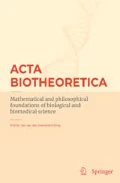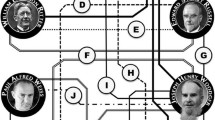Abstract
The aim of this article is to clarify the meaning of a naturalistic position within philosophy of biology, against the background of an alternative view, founded on the basic insights of transcendental philosophy. It is argued that the apparently minimal and neutral constraints naturalism imposes on philosophy of science turn out to involve a quite heavily constraining metaphysics, due to the naturalism’s fundamental neglect of its own perspective. Because of its intrinsic sensitivity to perspectivity and historicity, transcendental philosophy can avoid this type of hidden metaphysics.
Similar content being viewed by others
Notes
This polemic finds its point of departure in a symposium "Philosophy of Biology in the Netherlands and Flanders", organized by Thomas Reydon and Sabina Leonelli in Amsterdam in February 2004. Most of the presentations were published in Acta Biotheoretica, 2005, vol. 53. The present article proposes a continuation of the discussion. Its main focus is the article by Werner Callebaut in the just mentioned volume: "Again, what the philosophy of biology is not".
Van Fraassen speaks in this regard of an "empiricist recurrent revolt against metaphysics" (van Fraassen 2002: xiii, xvii).
"The light dove, in free flight cutting through the air the resistance of which it feels, could get the idea, that it could do even better in airless space. […] It is, however, a customary fate of human reason in speculation to finish its edifice as early as possible and only then to investigate whether the ground has been adequately prepared for it. But at that point all sorts of excuses will be sought to assure us of its sturdiness or to refuse such a late and dangerous examination" (Kant 1997 [1781–1787]: 129).
In analytic philosophy, as well as in philosophy of mind, ontological matters are quite frequently settled in terms of a "common sense" conception of what is and what is not, conception that is often close to "bon sens", involving arguments linked to social agreements and disagreements, to group consolidation, more than to philosophical arguments. According to Gilles Deleuze, common sense becomes "bon sens" within a representational viewpoint (which he resisted). According to him, common sense is the identity norm from the point of view the "pure ego" as it corresponds with the form of any object. "Bon sens" is the norm of sharing from the point of view of the empirical ego's as they correspond with objects qualified in specific ways (see Stengers and Verstraeten 1998).
Husserl pointed to the same thing in his fourth Logical Investigation (Husserl 1970b) (§14, note 3), in calling philosophy "the science of trivialities" ("Trivialitäten", i.e. banalities or evidencies). In his view, philosophy has to deal exactly with those things that risk to disappear by remaining unnoticed in the evidence itself. Wittgenstein too underlined a similar idea, when he provoked Moore and Russell to "prove that there is no rhinoceros in the room". What he pointed at, was precisely the kind of common sense realism Russell and Moore intuitively defended by considering the fact that "there is evidently no rhinoceros in the room", as a philosophical argument. Wittgenstein doubted exactly the philosophical value of this argument.
References
Callebaut W (2005) Again, what the philosophy of biology is not. Acta Biotheoretica 53:93–122
Derrida J (1989) Edmund Husserl’s ‘Origin of geometry’ an introduction. (Leavey JP Jr, transl.). University of Nebraska Press
Fichte JG (1970) The science of knowledge (Wissenschaftslehre). (Heath and Lachs, transl.). Appleton-Century Crofts
Husserl E (1970a [1936]) The crisis of European sciences and transcendental phenomenology. (David Carr, transl.) Northwestern University Press, Evanston
Husserl E (1970b) Logical Investigations II. (Findlay IN transl.) Routledge and Kegan Paul, London
Kant I (1997 [1781–1787]) Critique of pure reason. (Paul Guyer and Allen W. Wood transl. and ed.). Cambridge University Press, Cambridge
Stengers I, Verstraeten P (1998) Gilles Deleuze. Vrin, Paris
van Fraassen B (2002) The Empirical stance. Yale University Press, New Haven, London
Author information
Authors and Affiliations
Corresponding author
Rights and permissions
About this article
Cite this article
Kolen, F., Van de Vijver, G. Philosophy of Biology: Naturalistic or Transcendental?. Acta Biotheor 55, 35–46 (2007). https://doi.org/10.1007/s10441-007-9009-6
Received:
Accepted:
Published:
Issue Date:
DOI: https://doi.org/10.1007/s10441-007-9009-6




